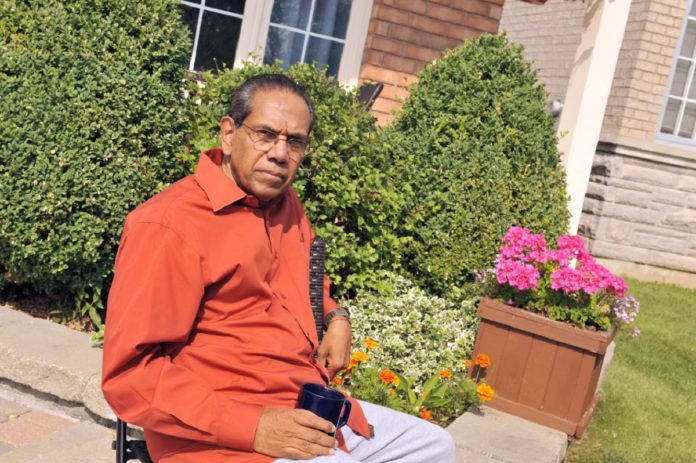Translated by: Aniruddhan Vasudevan
The girl in the green-yellow-white waitress uniform was a refugee. She could be either from India or Sri Lanka, or perhaps even Guiana. Not only was she dark complexioned, with black hair and black eyes, she also wore black lipstick and nail colour. Her name was definitely something long and with a string of consonants. She had shortened it and had pinned the name Rathna on one side of her dress.
True to her training, she stood a little away from the tables, just enough away to be noticed by the customers, but out of their earshot. That was the rule. And there were many other rules. While placing food on the table, she should serve from the left side of the guest: Rule 12.
She had to remove leftovers from the right side of the guest: Rule 11.
While pulling out a chair to help a customer sit, she should stand to the: Rule 26.
A napkin is folded and left on the left side of the plate indicated that the guest has finished eating: Rule 7
If the napkin is kept on the chair, it means that the guest has not yet finished his meal: Rule 9
The cutlery set at the table should begin from the outside and keep reducing as the meal progressed: Rule 19.
There were still more, and she knew them all by heart.
What bothered her were not the rules themselves. It was her English classes. Her teacher had said that nouns were very important. Salt, napkin, cheese, cucumber, glass, soup, olive, lettuce… but verbs were not as important at this point. All he said was that the verbs would come and join the nouns on their own at the right time, but he had not specified when and on what date they would make the appearance. Like the chants of some old prayer, she filled her single-lined copy book with nouns and committed them to memory. How were they to be used without verbs? But the teacher had said that it would happen eventually, and she had faith in him.
Her roommate scoffed at the way she learnt everything by heart. Perhaps she knew a better way to learn them. After she had found a lover, the roommate had started to mark the calendar with crosses. On those days, the refugee girl could not return to her room until eleven at night. Her friend said that she should not be a hindrance during the sacred moments of the lovers. Her boyfriend spoke in a voice that rattled like a tin pipe. When he stretched out his arm for a handshake, it dangled in front of her like a bunch of grapes. She had to do the shaking. His eyes never looked straight into hers. They were always focussed on some point above her right shoulder.
That day’s party had been arranged by one of the Canadian elite. They were so rich, it was said, that they changed their curtains every day, the bed linen twice and electric bulbs eight times in their house. It was well past eleven when the refugee girl came back to her room. She was paid by the hour. At wedding and birthday parties, she was extra careful. Her supervisor did not condone mistakes. Whenever the supervisor entered the room, with her black stockings pulled up tight and her arms spread like a bird preparing to take off, a certain cubic feet of air equal to her weight would get expelled from the room. No Archimedes was needed to calculate this; the girl was capable of doing it herself.
Her supervisor also sprang surprise tests on her.
‘What is this called?’
‘Pudding.’
She would cut a piece of the pudding and taste it. ‘Now, what is this called?’
‘Leftover food.’
‘What do you do with it?’
‘Throw it in the garbage.’
She had passed the test.
In addition to the rules in the book, her supervisor had given her some additional duties.
She should interact pleasantly with the guests. She knew this one already.
She should at all times try to satisfy the guests with intuitive understanding of their needs. She knew this one too.
Never do anything that could irritate the guest. She was aware of this as swell.
Since her English was not up to the mark, she was supposed to avoid making conversation with guests. If they asked her something, she could be generous with her smiles. She thought this last rule was quite unnecessary, for when she spoke without verbs, nobody really understood her anyway.
The guests at the table across from the main table looked strange. The one who looked like the mother must have been around thirty years. She guessed that the father would be around fifty, the son eighteen and the daughter eight. Then perhaps the woman was his second wife and the son born to the first wife. These were all just inferences she made; she was clever at making such assumptions.
She was in charge of their table. They were a lively bunch. They said something among themselves and burst into laughter every five minutes. Perhaps it was Polish that they spoke; it was full of consonants. But she could not make out if they were nouns or verbs. What could be common among a fifty year-old father, his thirty year-old wife, eighteen year-old son and eight year-old daughter? But their laughter sure was infectious. It made laughter well up inside her too.
It was then that she saw him looking at her. Generally, no one ever seemed to see her. But this 18 year-old red-haired boy was Iooking right at her with his piercing eyes. There were many girls at the party, but he was looking only at her. What did the rules say about this? What would her supervisor say? Could she return his gaze? She was not sure. She concentrated on her work.
She felt teased by this new experience. The red-haired boy turned to his sister and laughed often saying something to her. But the remnants of his laughter were always directed towards her, the refugee girl. Every time she went to their table to serve, his eyes touched her and stayed with her until she exited the room.
At one point, the napkin on his lap slipped down. She thought that his fingers had helped accomplish that. There was a rule she had to follow; she bent down, picked up the napkin and handed it to him. He thanked her and took it from her. Even as his lips were thanking her, his fingers were, without any doubt, pressing on her palm. As it always happened to her in unfamiliar situations, she began to shiver right from her feet. But she quickly moved over to her place like nothing had happened. Afraid of disturbing the air around her, she stood perfectly still. She stood at such a distance that she could not hear them, but be seen by them. That was Rule 17.
The guests then began to dance. His mother and father went to the dance floor. The mother went twirling round and round as she danced. The father, with a minimum of movements, accomplished his part precisely. His sister turned her chair around and watched the dancers intently.
Suddenly, a smile appeared on his face. He raised his hand and beckoned her. She hurried up to him and bent her wasp-like waist as much as she could, and said, ‘Yes?’ She was allowed to speak that much.
He said, ‘Coffee, decaf, two sugars.’ She felt his words fall sweetly on her ears. It felt like he had uttered her name with love. ‘Coffee, decaf, two sugars,’ had rolled out of his mouth smoothly, without touching his tongue. That day, he ordered coffee three times before the party was over. Her duty was to serve him whatever he ordered. Rule 22. So she was ready to serve him even if he repeated his order twenty more times.
The guests began to leave one by one. They too would be gone soon. His mother opened her handbag, set something right in it and then slung the bag on her shoulder, getting ready to leave. He picked up his napkin, folded it into a square, and placed it on his plate, with his eyes all the while on her. He then signalled with his eyes.
She had managed not to violate any rule. She took her time piling up the cups one over another. He kept staring at her. She picked up his plate and took it inside. When she removed the napkin, a five dollar note fell off the plate, and a phone number was written in ink on the napkin. Quickly, she wrote down the number on her palm. For the second time that day, her palm came of use to her.
Her roommate was not in when she got home. She turned her hand over and looked at her palm. The number was still there. She said the numbers once out loud. Even the numbers sounded sweet. Her mind swung in air like never before. What would the red-haired boy be doing now? Would he be thinking of her? The room was silent. She thought she should call him now. She thought that nobody would answer her call at that hour. So she slowly dialled the numbers one after another.
A voice spoke at the other end immediately. She recognised the voice. It was the same rounded voice that had said, ‘Coffee, decaf two sugars’. But her hands shook, her voice faltered and her thighs trembled. She put the phone down. But exactly a minute later the phone rang. He must have pressed the last number received on his phone. She did not take the call. She stood some distance away and looked at the phone like at a coiled-up snake. It continued to ring. Finally it fell silent after saving up a message that he left on it.
When she replayed his message and listened to it she could understand only half of it. His voice showed some hesitation as if he wondered if he was speaking to the right person. But he seemed to have guessed who his caller might have been. He begged her to call him again.
She did not call him, but played his message over and over whenever she wanted to hear his voice. It became her special ritual. Somehow, her roommate got wind of it. Perhaps, she was even a trifle jealous of it. One day, her roommate erased that message when she was away. The girl was in great agony.
The room they shared had just a roof, a door and a window. Her friend’s cot was right beside hers. If she stretched her hand, it would hit the other girl’s face. So the refugee girl always lay down close to the wall. There were many other problems as well. She did not like the way the croaky-voiced boyfriend looked at her. When her friend was not in the room, he would call and make enquiries about his lover. Should he not put down the receiver as soon as he was told that the girl was not available? He wouldn’t. He would try and pick up a conversation with the refugee girl.
One winter day, when the sun refused to come any higher than one’s shoulder, her roommate and her boyfriend treated her to a meal. They wouldn’t take a ‘no’ for an answer. It looked like they were determined to put her through as much agony as they could before the day ended. Unaware of their intentions, she went. Only later did she realise that their sole aim was to torture her. They had worn dark glasses, hoisted over their foreheads as if to suggest they belonged to a particular group of elite. They often conversed in some sign language and broke out in sudden bouts of loud laughter. She had no clue what was going on, but she felt that most of their laughter was at her expense. She did not like it.
When she finally got to her workplace, she had only a few minutes left to get ready for work. Usually, she was ready and in her uniform well ahead of time. That was as per Rule 16. She would be sent to any of the dining halls. Rule 18. Some girls who had come there looking for a waitress’s job like hers were already there, waiting. That day she worked continuously for ten hours as if she was out to avenge somebody. She did not sit down even for a minute. Her legs ached. Her arms were tired with carrying heavy plates around. But by then she was used to that kind of work. The party went on after midnight. On such occasions the supervisor became an epitome of kindness. She’d give them a five-minute break.
Between the dining room and the party hall there was a small room tucked in. It had an old model black telephone, with the numbers on its face that could be dialled. Every time she went past that contraption, she felt a great emotional turmoil. Her heart beat fast. He came up in her thoughts that day like never before.
After she had called him for the first time a few weeks ago, she had called him three more times. Every time, it was answered by a gruff male voice. Perhaps it was his father. She cut the call at once each time. But on that day she was desperate to hear his voice. She placed the plate she had in her hand on the floor and dialled the numbers on the telephone. Her fingers trembled. Her heart throbbed inside her like a sparrow in its last few moments of life.
Surprisingly, it was him. It sure was him; she had no doubt of that. The world seemed to dry up instantly. No sound came out of her. He kept calling, ‘Hello!’ ‘Hello!!’ What was she to say? What could she say? What should be the word to speak? What should be her tone? She had not considered any of these. She had just wanted to hear his voice. He said, ’Hello!’ once more.
‘Mozzarella Salad’
‘Lettuce’
‘Fruit cake’
‘Spaghetti vongole’
‘Lasagne’
She did not have any verbs. She merely recited all the items the party ordered a few weeks earlier. She only heard a faint sound, between spurts of laughter, from the other end. With that the girl cut off the phone.
Three days later, she stretched out her legs on the bed, crossed them one over the other and tried to recall the face of the red-haired boy. Suddenly her friend opened the door and entered the room. The noise of her opening the door was far greater than when she banged it shut; it was a wonder how she managed it. She shook off her shoes, still standing, and threw away her handbag. Her quivering lips went up and down like the eye lids, but no sound came out of her.
The refugee girl did not open her mouth. As if she woke up just then, she rolled over to the other side, turned her head both ways, and looked. Sub-standard room, bad friend, dirty blanket, and an awful smell. In that room she met with the wall whichever way she turned. She closed her eyes once more and tried to recall his face. She remembered how his lips rolled and the words slipped off of them:
‘Coffee, decaf, two sugars’
‘Coffee, decaf, two sugars’
She drifted off to sleep.
He did not stay put after the telephone conversation got cut off. It took him very little time to guess that it was the waitress who had rattled off all the items he had eaten at the party. But he needed some time to find out the company she worked for. He also had to find out when the company sent its employees to which party hall. But he kept up his efforts relentlessly. He went to different party venues and looked for her. But the refugee girl was quite unaware of all this.
He was on the top of the stairs. And the refugee girl was standing at the bottom. She saw him before he saw her. But by then he had also seen her. The way he looked at her seemed to carry all the words that he had brought with him from Poland. Her look too conveyed nouns, verbs and all kinds of words mentioned in the grammar that she did not even know. He needed them all. She held the plate that she had in her hand close to her green yellow and white chest. She looked like an angel in that uniform. He took two steps at a time and hurried up to her only to find that the plate stood between them. She was holding on to it tightly. She looked down. On that plate were all kinds of food that would be eaten in another few minutes by some guest in that party. She broke rules no 27, 32 and 13, all at the same time.
About the author:
Appadurai Muttulingam (Tamil அ. முத்துலிங்கம்) (born 19 January 1937) is a Sri Lankan Tamil author and essayist. His short stories in Tamil have received critical acclaim and won awards in both India and Sri Lanka. He began writing short stories in the 1960s, with his short story Akka winning a competition conducted by a Sri Lankan Tamil newspaper in 1961. This story was the title story in his first collection of short stories, Akka (“Sister”), published in 1964. Many of his story collections have been published since then. He is actively involved in The Tamil Literary Garden, a Toronto-based charitable organization dedicated to the international promotion of Tamil literature. Muttulingam’s stories are noted for their understatement, reserve and imagery, and focus on moments of small transformation. His stories do not attempt to directly build suspense or dramatic tension, and are instead grounded in realism, particularly in description and characterization.



















